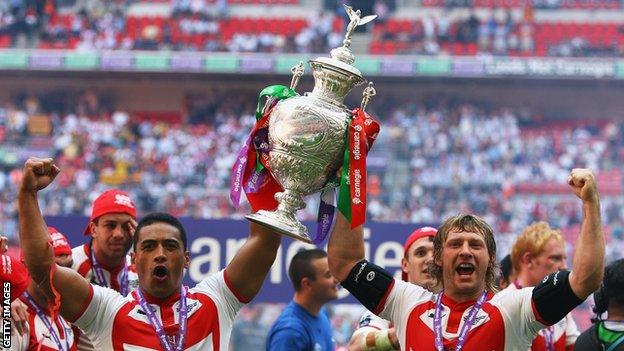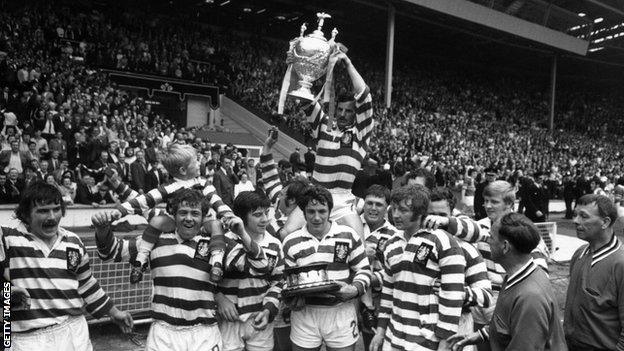Challenge Cup: Leeds Rhinos v Salford Red Devils final behind closed doors provides another competition first
- Published
Salford stun Warrington to reach first Challenge Cup final in 51 years
Coral Challenge Cup final: Leeds Rhinos v Salford Red Devils |
|---|
Venue: Wembley Date: Saturday, 17 October Kick-off: 15:00 BST Coverage: Watch on BBC One and BBC Sport website and app, listen on BBC Radio 5 Live sports extra, BBC Radio Leeds, BBC Radio Manchester and online, follow live text coverage on BBC Sport website and app |
The 2020 Challenge Cup has had to plot a difficult path to this weekend's final.
The tournament began back in January, when community clubs Skirlaugh and Hunslet Club Parkside helped kick things off with their first-round tie, streamed live on the BBC.
Nobody could have imagined at that point the impact that coronavirus would have. Lockdown, withdrawals and redraws have helped define this season's cup story.
But in a unique year, Salford and Leeds will provide a first for the 124-year-old tournament - it will be the first final to be played in an empty stadium.
Covid-19 restrictions mean the stands will be empty for the first time for one of sport's big occasions, providing a fitting excuse to look at some of the other firsts in the history of the game's oldest knockout trophy.
Batley start Challenge Cup story
The first Challenge Cup final took place on 24 April 1897 when Batley and St Helens met at Headingley.
Graham Morris' history of the cup - Destination Wembley - relates how a mainly partisan Yorkshire support in a crowd of more than 13,000 may well have played a part in The Gallant Youths' 10-3 victory over Saints.
When St Helens came out for the game, "few of them gave the sturdy Lancashire lads a welcoming cheer", but when Batley entered the arena "a cheer of rousing dimensions" erupted.
It is worth noting, in this year of congested fixture lists, that in 1897 St Helens reached the final, having won their semi-final against Swinton only five days earlier.
First games for 'old' and 'new' Wembley
The first Challenge Cup final at Wembley - or the Empire Stadium as it was known then - was in 1929, when the great Jim Sullivan inspired Wigan to a 13-2 win over Dewsbury in front of 41,000 supporters, with Syd Abram scoring the first try at the stadium.
The final had been moved to Wembley in a bid to increase the national profile of rugby league. The Manchester Guardian reported: "The most astounding revelations which the game gave to southerners were the terrific speed of which it was fought out and the goal-kicking of Sullivan."
Wigan's side included five Welshmen and one Scottish player - Roy Kinnear, the grandfather of actor Rory Kinnear.
The first final to be staged in the new Wembley stadium was in 2007, after a seven-year absence and a £789m rebuild.
Previous finals in the new century had been staged at Murrayfield in Edinburgh, Cardiff's Millennium Stadium and Twickenham while building work was going on.
But in 2007 it was back at the national stadium and St Helens beat Catalans Dragons 30-8. Saints' James Roby marked the return with the first try at 'new' Wembley in the 33rd minute.
The game also featured the first try scored in the final by a Muslim, Catalans' Morocco-born winger Younes Khattabi crossing shortly after Roby's effort.

St Helens beat Catalans at the rebuilt Wembley in 2007 to lift the Challenge Cup for the 11th time
Paul's try-scoring milestone
The final had also moved away from Wembley during World War Two, but returned in 1946, which also saw the awarding of the first Lance Todd Trophy - in memory of the great New Zealand-born player and administrator.
Billy Stott, the Wakefield Trinity skipper, was the first man to win what has become the most prestigious man-of-the-match award in rugby league after they beat Wigan 13-12.
For years the holy grail of every try scorer at Wembley was to score a hat-trick, and Bradford Bulls' Robbie Paul finally became the first hat-trick man in the 1996 final. But his treble could not stop St Helens winning 40-32 in a breathtaking encounter.
The sponsors, Silk Cut, had put up a £10,000 individual cash prize for anyone who could achieve the feat - but Paul had to share the money with all his team-mates.
He has since revealed that before the game he had persuaded his fellow Bulls players that the money should be divided between them, thinking it was more likely that a winger would cross for three.
His hat-trick has subsequently been bettered. Leeds Rhinos' Leroy Rivett scored four tries in the 1999 triumph over London Broncos, and Tom Briscoe crossed five times as Leeds, again, beat Hull KR 50-0 in 2015.
When the Pope moved a final replay
The first drawn Challenge Cup final at Wembley was in 1954 when Warrington and Halifax finished 4-4 at Wembley.
Just under two weeks later they met for the replay at Bradford's Odsal Stadium when an official crowd of just over 102,000 - but estimated unofficially as more than 120,000 - saw Warrington win 8-4.
There has been only one drawn final since, Widnes and Hull ending 14-14 at Wembley in 1982 in a game which ended in confusion.
Many of the players on the field that day have since admitted they did not know whether there would be extra time when the full-time hooter went, and it was a short while before they and many in the crowd realised it was going to a replay.
That replay was originally scheduled to be played at Wembley again, but a papal visit to London meant it was instead switched to Elland Road, Leeds, and Hull won 18-9.
That will be the last replay. After a change in the rules for 2017, a drawn final now goes straight into golden-point extra time to determine a winner on the day.
First to take an early bath

Leigh won the Challenge Cup for the second time when they beat Leeds in 1971 - they have not reached the final again since
The first sending-off in a Wembley final came in 1971, famously featuring Leeds' Sid Hynes, Leigh's Alex Murphy and referee Billy Thompson.
Hynes was alleged to have headbutted Murphy and was given his marching orders. But the legend that grew was that Murphy was feigning injury and winked at Hynes as he was being carried off on a stretcher.
Murphy has always denied that, saying he was genuinely injured. Hynes claimed he had missed with the headbutt and caused no damage. The cameras failed to capture the crucial moment.
History shows that Leigh won 24-7 and Murphy was awarded the Lance Todd Trophy for his role in the game, not the alleged acting on the stretcher.
Making broadcasting history
The Challenge Cup final was first broadcast by the BBC in 1927, when the corporation provided radio coverage of the Oldham v Swinton final, according to sport and rugby league historian Tony Collins in his podcast Rugby Reloaded.
The first national TV coverage of the cup final came in 1952, meaning Saturday will mark the 68th anniversary of that screening and will provide another first - the first final in which crowds will not be allowed in.
Will it be a first win at Wembley for Salford since 1938, or a 14th cup final success for Leeds? Either way, crowd or no crowd, and just like every cup final since 1896, it will begin with the potential to be another memorable chapter in the rich history of the tournament.

David Attenborough on the future of our planet: 'We have to believe it's possible'
Virgil van Dijk talks to Eddie Hearn: What was it like to deliver the Premier League trophy?

